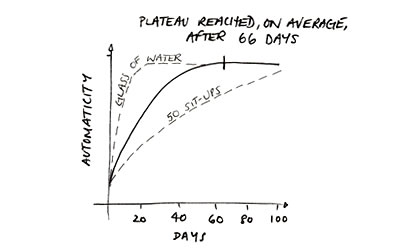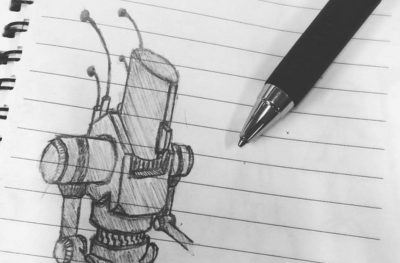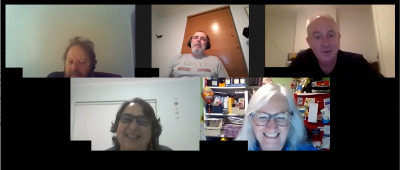Predicting the future
A morning coffee at that cute little cafe or the commute to work, and even brushing one’s teeth, smoking a cigarette or the daily bowel movement is automacy that form in our lives. Those behaviours that we create that our days would not be the same without.
Like breathing, or eating, or the chat around the water cooler in the office life’s not the same without. Yet, similarly, many of our habits we’d prefer to live without. Unhealthy eating, lack of exercise or excessive drinking, smoking or the bad habits that make us human.
“Bad habits are like a comfortable bed, easy to get into, hard to get out of.” Proverb
A 2009 study explored Lally et al. (2009) published in the European Journal of Social Psychology explored the time it took for a chosen behaviour to become automatic. The participants showed a curved relationship between practice and automaticity, with a plateau in automaticity was reached after 66 days on average. People tended to range from 18 days up to 254 days in the habits examined in this study. Some habits were far easier to adopt. Drinking a daily glass of water became automatic quicker than 50 sit-ups before breakfast.

People are generally pretty lazy, and seek the easy route.
In many ways being forced to work from home and avoid the daily commute is a dream come true. No manager to hassle at every moment, more self accountability, and time for Netflix, sleeping in or have a few boozy drinks on a work night is all good. Many are loving the freedom, with some discussing how they are enjoying getting up, no need to shower or dress formerly and clock on for work in little time. Yes, people are likely missing friends, family and socialising, but not needing to rush kids to sport and extra-curricular activities each night and much of the weekend, is (secretly) sweet. More time for taking it easy.
COVID-19 has changed the defaults as to how we behave. Local restaurants and pubs have responded to lockdown with offering unique take-away and home delivery options, often attempting to avoid needing to use Uber or another similar service and their hight fees. Conversation around challenging economic conditions and the new norm of supporting local, has shifted the conversation to give permission to pay more for helping businesses in need at this challenging time.
“Default options are pre-set courses of action that take effect if nothing is specified by the decision maker (Thaler & Sunstein, 2008), and setting defaults is an effective nudge when there is inertia or uncertainty in decision making (Samson, 2014).” (More >)
Wineries, gin producers and artisan food producers are shifting to online and selling direct to customers as opposed to through markets and restaurants. New defaults are being set, making decisions easier and smooth. Assuming such businesses can maintain strong customer satisfaction, it is likely such new norms will be set moving forward. Online shopping, direct from the producing is said to be growing recently.
Businesses pivoting and offering consumers the chance to try a better way, are likely to create new habitualness moving forward. Yet critically in this, businesses are driving change and making it easier for consumers and creating a better future, rather than waiting for trends to manifest.
Likely understanding market gaps and pain points is critical in driving change. This is a time for listening to human needs and responding. Experimenting, changing the rules and defaults, and testing ideas. To take time to deeply research consumers, customers, audiences, and population segments as to how to best change the defaults and make life easier, and on this add some joy and step beyond the old norms.
It is impossible in many ways to predict the future and where we are heading, but the critical opportunity at the moment is preparing for life though and exiting COVID-19. Rather than waiting for life to get back to normal, it is a unprecedented opportunity to reinvent and reimagine, to reshape the future, our norms and defaults, and make things better.




